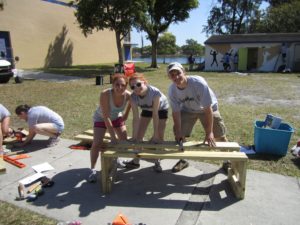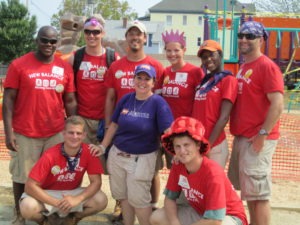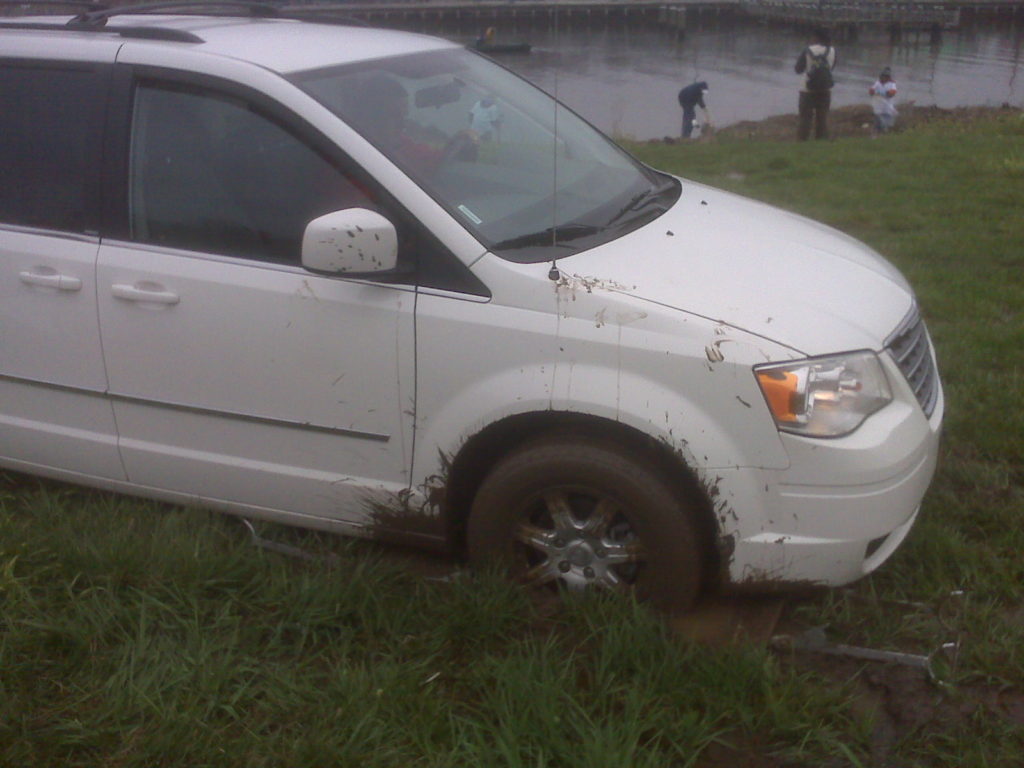Care Force Alumni Spotlight: Aundrea Dean
 We are really thankful to have been able skype with Aundrea and talk about her experience serving with City Year. We also got to talk to her about what she is up to now and how she uses her Care Force experience to further her career.
We are really thankful to have been able skype with Aundrea and talk about her experience serving with City Year. We also got to talk to her about what she is up to now and how she uses her Care Force experience to further her career.
Brittany: What is your favorite memory from your first AmeriCorps year?
Aundrea: My favorite memory would be their (my students) graduation. I had an actual class of 26 students that I worked with for the year. I had a core group of 13 that were at risk of failing, so I primarily worked with those individual students. However, I also still worked with the entire class. In Los Angeles, 8th grade ends your middle school career, and 9th grade starts high school. At the end of the year, to be able to see 11 of the 13 children that I primarily worked with be promoted to 9th grade. It was my fondest memory from my first year.”
Ben: So leading into Care Force, what was your favorite Care Force trip and why?
Aundrea: “My favorite Care Force trip was the Hillel trip in Miami. I think it took place in the first week of March, and it was my favorite trip because it was the one that they (the staff) allowed us to plan from beginning to end. I mean, they already knew we were working with college students and that we were going to Miami to work with the Boys and Girls Club. However, we were able to work directly with the Boys and Girls Club to determine which projects we wanted to work on, as well as help organizing the teams as far as how many people were going to be allocated to work on each project. The event was one week long with service taking place every day.
For me, it was the trip that I was able to take the most ownership of and to be able to see it from beginning to end was great. I also learned a lot about the process, about project management, and about myself during that week. We spent all this time planning the projects and then we get to Miami and find out that LeBron James was actually working with the same Boys and Girls Club that week. So, the projects that we originally were going to do, like the gym project, we found out that he was taking lead on those. This meant that, last minute, we had to run around and decide what we were actually going to do with our volunteers. We had these college students coming down in the next day or two, so we needed to have service for them to do. It was kind of crazy, but everything worked out. The volunteers had a good time, and at the end of the day, the Boys and Girls Club looked amazing.”
Ben: What was different about this trip that allowed you to take leadership of it?
Aundrea: “To be honest, I’m not sure. That would be more of a management question. I guess that was just one of the things that they allowed us to do our year.”
Hugh: “Yeah, Ben, what basically happened was we had worked with that organization the year before. They told us they didn’t have enough budget to do the event the next year and asked if it was possible to do it on a lesser budget. The only way we could really do it is if we had the AmeriCorps members lead it and just have a staff member guide them through the process. So correct me if I’m wrong, Aundrea, but I think one person was down there with you, just overseeing everything. But the team really led all the service development, and that was the agreement with the partner because it was really the only way we could make the money work. But there hasn’t been any partner that we’ve come across in the last few years where they’ve asked about a reduced budget and we’ve proposed that idea.
So the LeBron James thing was funny because I remember that happening a lot that year. You all remember, that was when he made the decision to go to the Miami Heat, and as part of that, he televised a special where he donated three million dollars to Boys and Girls Clubs, which went out to a bunch of different clubs as grants. So what would often happen on site visits is you’d go to a Boys and Girls Club and set up potential service, and you’d get a call two weeks later about how they were getting LeBron money, so certain projects would have to be cut. That happened to me personally a couple times. It was great that all of that was happening and clubs were being renovated, but it was getting challenging to find service at Boys and Girls Club.”

Brittany: With the question you just answered, you mentioned some skills that you developed with Care Force. Do you have any that you think are most relevant to your current work?
Aundrea: “Yes, definitely project management, organization, and communication. I think like Hugh mentioned, I am in the legal field. Right now I’m not a licensed attorney, but I still work in a courtroom on a day-to-day basis, and I’m working with the public. I learned a lot about project management and that correlates into my day-to-day experience. I don’t know if you’ve been to court or what your experience with the legal system is, but no two days are the same. To give you a little background, I work for child support, and I work in our child support court. On any given day we can have 50-90 cases on the docket. You just have to be flexible; even though you’ll go in with a plan or a direction in mind, things don’t go the way you want them to go. Then you’ll have to project manage in the sense that you’re working with two other case members and trying to make sure they gather the information that myself as well as the actual attorney that’s presenting the evidence to the judge needs. Being able to manage what the attorney needs as well as managing new case managers that we’re working with as well as learning how to deal with the public: these skills pair with being organized, being able to communicate efficiently, as well as work well under pressure. I learned a lot in Care Force that works well with my day-to-day work now.”
Ben: You kind of dipped into this a little; what is your current position?
Aundrea: “Right now, I am a legal assistant, or child support enforcement, with Mecklenburg County. I handle all of the tasks that the attorney doesn’t necessarily have the time to do, like gathering all of the information, writing up the order, handling the management with talking to different attorneys, getting the information to other attorneys that they may need.”
Ben: Have you been doing this since you graduated with Care Force? What led you to this?
Aundrea: “Once I graduated Care Force, I went to law school for three years. I graduated in 2014 and life just kind of happened. I had to step back from the bar, and I’m now getting myself to that point to take the bar exam and the ethics exam to actually become licensed. But for a while I was working in the private sector with a law firm. I wanted to continue my passion of working or advocating for children and this opportunity came up, so I’ve been here the last two years.”
Brittany: We actually have somebody on our team who is studying for the LSAT right now. I think he’s scheduled to take it in June. Do you have any advice for him transitioning from Care Force into law?
Aundrea: “I’ll just start by saying that the LSAT is completely different from law school. I think that the discipline that you learn while working with Care Force is a discipline that you can take into law school. You just have to be open because law school is not necessarily hard; it’s just teaching you a different way of thinking and a different way of learning. So as long as you’re open to learning and don’t go into it with — I don’t want to say the same mentality that you went into undergrad with because of course you want to go in prepared to study and work hard. But it’s different in the sense that you’re trying to get an idea of why people, or the Supreme Court I guess I’ll say, made the decisions that they made. You know, it’s going to be a lot of hard work, but just like with the projects you’re working on during Care Force, it will be a beautiful ending if you stick with it.”
Brittany: Since we’re on the topic of advice, do you have any advice for future TCF members or potential City Year AmeriCorps members?
Aundrea: “My advice would be to just enjoy the ride. Like I said, it’s going to be a lot of hard work, but if you really stick with it, and you enjoy the moment, you’ll come out with great memories and a lot of friends.”

Ben: What CY culture pieces do you incorporate in your place of work and/or miss that is not found in your work?
Aundrea: “I find myself doing the debriefs though I don’t necessarily call them debriefs. I don’t think my team likes them, but I love them. Like I mentioned before, court is different from day to day depending on if we’re doing show causes, basically trying to get people to let us know why they’re not paying, or if we’re establishing an order or if we’re modifying an order. Court is just different every day so to me, I like to debrief because it allows our team to discuss what worked well, what didn’t work well, and if there were things individuals felt they needed and didn’t get. Then, the next time that particular situation arises, we can all be on the same page, as far as how to handle certain situations. I try to do them fairly often, and like I said, I don’t think my team really likes them, but I find them effective.”
Ben: I like that. Gotta love a good debrief.
Brittany: I know. I feel like I’m going to start taking those with me too. I just appreciate having the time to sit down and, like you said, talk about what worked, what didn’t work, and what we need to do moving forward.
Aundrea: “Right, it helps you just reflect on different things.”
Brittany: Speaking of things that City Year has that other places don’t, I know that City Year has a lot of specialized language and lingo that we use here, especially about roles and positions that people serve in. How did you translate those experiences and that lingo into language that other organizations and companies would understand and have similar experiences with?
Aundrea: “I think, like I said with the debriefs, I don’t necessarily call it a debrief. I just send an email with a meeting request to talk about how court went, and you know, get an update or discuss what’s going on. You know, I think in my line of work, we have similar lingo, and so I just don’t really use those terms. I just say that we should meet and discuss what happened in court. I really like doing the starfish moment, which we don’t necessarily do starfish moments. I guess the best way to describe it is what we call learning moments. When we’re working with new case workers -we’ve just had a new paralegal join our staff- we talk about our learning moments or ask them if they had a learning moment. I guess that’s kind of similar to some of the lingo or trying to bring the CY culture into the legal child support place.”
Ben: What was a big learning or “a-ha” moment that you had while serving on team Care Force?
Aundrea: “I think I had two, and, Hugh, don’t hate me for telling these stories, but one was don’t drive a van through mud, first and foremost. My second learning moment was if you’re traveling out of the country, make sure you do all of your research before doing so. Those are my two. If I don’t remember anything else from Care Force, I remember that.”
Brittany: Did you travel out of the country while you were a corps member?
Aundrea: “No, it was after graduation.”
Brittany: If you had, I was going to be so jealous.
Hugh: “It just worked out on the calendar that year. So their team graduated and then right after graduation we had these international trips that were taking place in the UK.”

Thank you, Aundrea. We truly appreciate you taking time out of your day to share your experience with us.
Note: The original conversation took place on 3/5/2020.
Related stories
Team Care Force member Andy Wilson shares some of his favorite things about traveling with Team Care Force.
Read more about My favorite things about traveling with Care ForceCare Force is proud to welcome seven new senior AmeriCorps members serving as project leaders on Team Care Force.
Read more about Welcome Team Care Force #16Team Care Force ventures to East Palo Alto, California, in their yellow City Year jackets to prep and lead a...
Read more about Emerson Collective at EPA BloomhouseIn October 2021, Noel Wuesthoff led Aramark volunteers in his first ever in-person event in Dallas and again a few...
Read more about Aramark Unites Against Poverty















